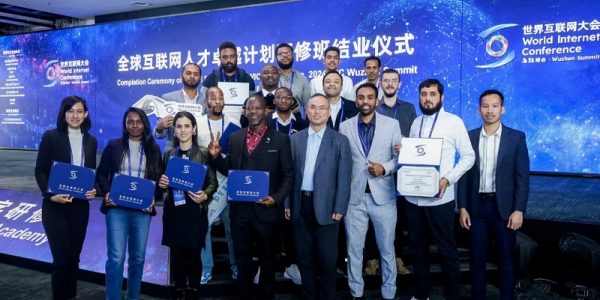
- Home
- Media Center
- Events
- Membership
- Digital Academy
-
Reports
- Collection of cases on Jointly Building a Community with a Shared Future in Cyberspace
- Collection of Shortlisted Achievements of World Internet Conference Awards for Pioneering Science and Technology
- Reports on Cross — Border Ecommerce
- Reports on Artificial Intelligence
- Reports on Data
- Series on Sovereignty in Cyberspace Theory and Practice
- Other Achievements
- About WIC
- 中文 | EN

WIC Global Elite Training participants gain in-depth understanding of digital transformation
The World Internet Conference Global Elite Training was held in Wuzhen, East China's Zhejiang province, from Nov 21 to 23.
This training program, focusing on the digital economy, cutting-edge internet development trends, and leadership skills in digital transformation, brought together 40 participants from 32 developing countries.
It was designed to enhance the digital literacy and leadership skills of the management of governments, enterprises, and organizations around the world, especially in developing countries, and to foster talent with strong leadership capabilities in digital transformation.

Participants take a group photo at the closing ceremony of the World Internet Conference Global Elite Training. [Photo/wicinternet.org]
The program featured lectures on such topics as new quality productive forces, the digital economy, and artificial intelligence (AI) large language models. Top experts from prominent institutions, universities, and leading internet enterprises delivered these lectures.
Jiang Xiaojuan, professor at the University of Chinese Academy of Social Sciences and former deputy secretary-general of the State Council, delivered a lecture titled "New Quality Productive Forces and the Digital Economy". Jiang noted that the Global Elite Training program enables international exchanges of digital economy experiences, while sharing China's progress and practices with the world.
Zhou Hongyi, founder of 360 Group, explored the role and evolution of large language models in his lecture. Zhou elaborated on the characteristics, applications, and limitations of AI large language models, stressing its transformative potential for industrial upgrading and digital transformation.
Alexandra Brintrup, professor in digital manufacturing at Cambridge University, gave a lecture themed on AI-powered digital manufacturing. She discussed the use of AI in operations and supply chain management, emphasizing the influence of the digital age on supply chains and the power of AI to optimize supply chains and improve efficiency through decision-making support and predictive analytics. She commended China as a global leader in AI development and an advocate for international cooperation in this field. Brintrup highlighted the program's value in offering hands-on AI knowledge to participants from developing countries, enabling them to unlock their countries' digital potential.
Francis Mwila, an economist from Zambia's Ministry of Finance, said he gained a deep understanding about the application of AI from the training, especially in boosting manufacturing efficiency in developing countries.
Nasser AL Musalhi, head of Applications Development Department at Oman's Ministry of Justice and Legal Affairs, appreciated the opportunity to gain in-depth knowledge and directly engage with AI experts. He said that he would apply these cutting-edge technologies and concepts to Oman's innovation projects, and contribute to the country's digital transformation and economic progress.

The World Internet Conference (WIC) was established as an international organization on July 12, 2022, headquartered in Beijing, China. It was jointly initiated by Global System for Mobile Communication Association (GSMA), National Computer Network Emergency Response Technical Team/Coordination Center of China (CNCERT), China Internet Network Information Center (CNNIC), Alibaba Group, Tencent, and Zhijiang Lab.





